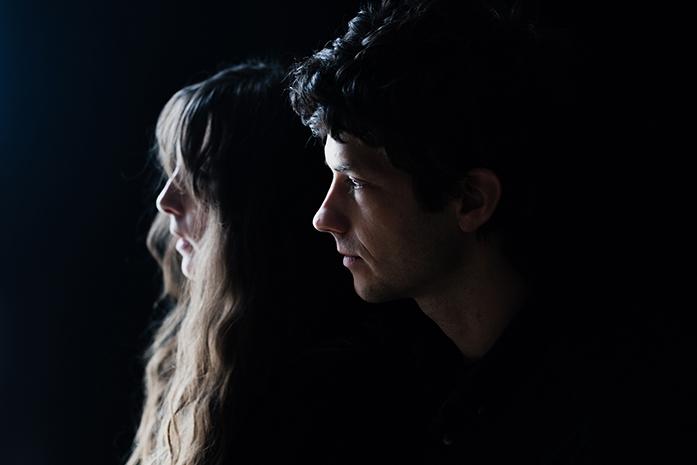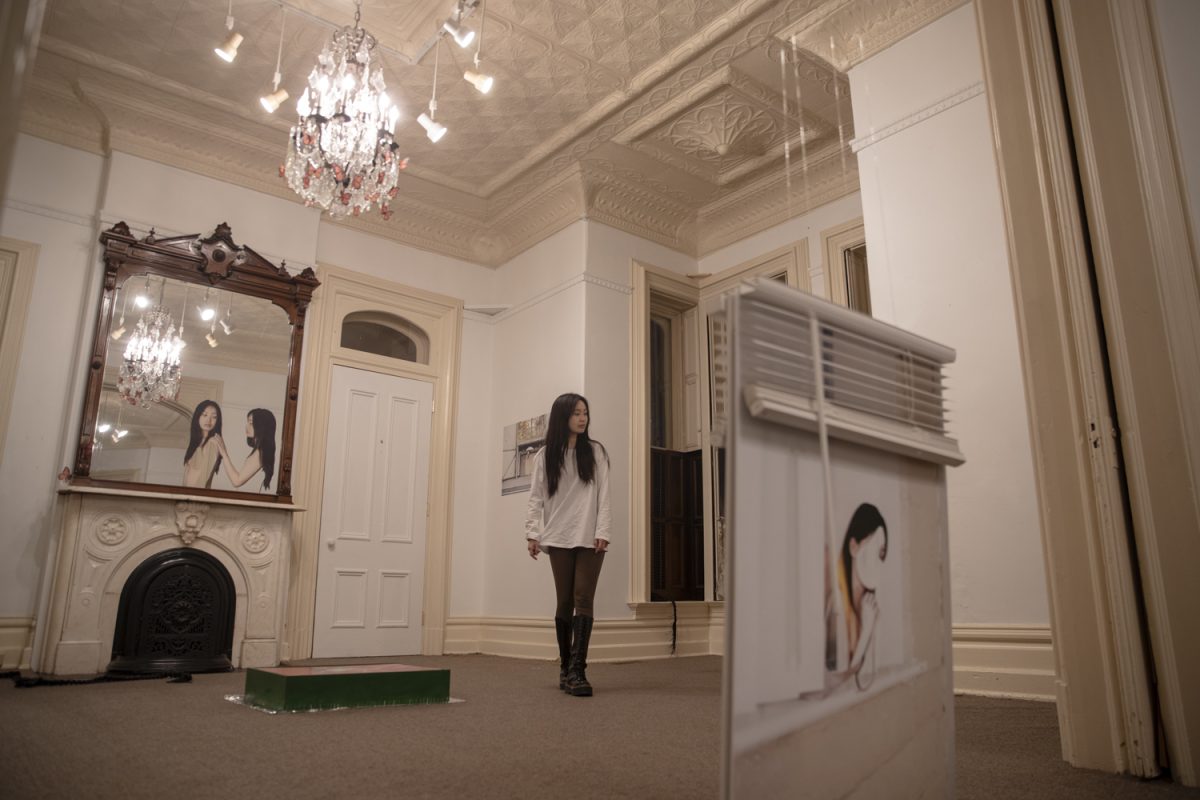On August 14 dream-pop duo Beach House will cast their signature eerie atmosphere in the Englert Theatre.
By Tessa Solomon | [email protected]
n the Friday night of 2016‘s Pitchfork Music Festival in Chicago, the band Beach House’s Victoria Legrand and Alex Scally transfixed the crowd at Union Park with their signature dream pop — delicate guitars, buzzing synthesizer, haunting lyrics that search the boundary of sorrow and nostalgia.
I watched the performance via the live stream on Pitchfork’s website, three miles away in an apartment I had booked at the last minute through Airbnb. Cash-strapped, I could only afford a Saturday day-pass. The video repeatedly buffered on my laptop, but that gave me an opportunity to appreciate the cobalt spotlight illuminating the stage’s smoke, the intensity of Legrand’s stare, her hands pressed to her keyboard. In the frozen frame, I noticed the neck of Scally’s guitar leaning toward Legrand; it, too, seemingly magnetized by the duo’s unspoken connection.
The stream jolted back to life. In the hushed chorus of “Space Song” — a standout track from the 2015 album Depression Cherry — Legrand pleaded, “fall back into place.”
It seemed, though, after six solid albums released in one decade, Beach House’s sound was snug in its place.
My status as a spectator, twice removed, barely stung, though. On Aug. 14, the two will play at the Englert, 221 E. Washington St., and I knew my ticket was waiting in the box office.
Iowa City is one stop among many in an extensive tour the New England natives are embarking on for their latest (2015) studio releases, August’s Depression Cherry and October’s Thank Your Lucky Stars.
Since the 2006 release of the two’s first album, Beach House, their hypnotic allure has made them a favorite among critics and fans of indie pop. Forming Beach House’s physical aesthetic, however, took at least 50 performances, Scally said. Even now, every element is examined with an attention to detail usually reserved for solving chemistry equations.
“We’re always trying to get better at understanding what it is you need to do to get better at staging a great show,” Scally said. “The set list, the walk-in music — we’re always scientifically trying to figure out what are all the things that contribute to a really special night.”
The number of details the two consider before each show is dizzying, whether the venue is standing or sitting; whether the walls are bright or dim; what the distance is from the stage to the bar, if the show is on a Monday or Friday.
“Some of those things are always out of your control; other times, you know you did just the right thing,” Scally said. “Everyone, I think, goes to concerts for their own reasons, and we try to make it real.”
In contrast, Scally emphasizes the holistic approach the two find themselves adopting when writing new material.
“If there’s any question when writing music, it’s ‘Does this song make me feel anything?’ I don’t think [of] working on music [as] an intellectual exercise … we want to get lost in the feeling of that song,” Scally said.
On the consistency of their style, a fellow DI reporter recently noted, “Beach House plays Beach House.”
That can be seen in the group’s repeated dismissal of fast-paced pop trends. From an outside perspective, the sound shifts like tectonic plates — the movement is subtle but visible upon close inspection. Wherever they record — either in Louisiana, at the famed Studio in the Country, or in a well-worn Baltimore warehouse, one of the group’s regular locales — progression has never felt so seismic.
Scally offers Thank Your Lucky Stars’s “Elegy to the Void” as an example. On the track, his usual chords — which typically serve as a supporting act, deferring the spotlight to Legrand’s vocals — are replaced by all-out chaotic shredding.
“Sometimes, I think people have very narrow-minded visions of sounds. For us, [“Elegy to the Void”] was a very new sound,” Scally said. “But maybe for a listener, that sounded exactly like us, though it was a new direction.”
Stars also heralds a new direction for their approach to the conventional album rollout. Having written the album in extra, unanticipated studio time after Depression Cherry’s quick wrap, the band decided to forgo commercial promotion almost entirely.
“Maybe this is just in our own heads, but as we become a bigger and bigger band, in terms of recording records and filling up shows, there is a pressure,” Scally said. “ ‘What’s your lead single? How are you going to roll this record out?’ And that energy is fatiguing. I think we just wanted to be selfish and not worry about that kind of stuff.”
The result was an album that both presented a pronounced edge and was similarly evocative of a nostalgia just barely too fleeting for sadness. As I listened to the music, impressions, more than memories, of my adolescence bubbled to the surface: the sting of vodka quelling nerves before a first date, the sickly sweet stench of ringlets crisping in a flatiron.
I’m curious about the mood and reactions Beach House will arouse in the Englert, but I’m not sure those musings would be of interest to Legrand and Scally.
“If they say our music makes them go to sleep, awesome; if it irritates them, fine,” Scally said. “That’s their own journey; the only thing that means anything to us is that people like it at all.”
By Tessa Solomon | [email protected]
n the Friday night of 2016‘s Pitchfork Music Festival in Chicago, the band Beach House’s Victoria Legrand and Alex Scally transfixed the crowd at Union Park with their signature dream pop — delicate guitars, buzzing synthesizer, haunting lyrics that search the boundary of sorrow and nostalgia.
I watched the performance via the live stream on Pitchfork’s website, three miles away in an apartment I had booked at the last minute through Airbnb. Cash-strapped, I could only afford a Saturday day-pass. The video repeatedly buffered on my laptop, but that gave me an opportunity to appreciate the cobalt spotlight illuminating the stage’s smoke, the intensity of Legrand’s stare, her hands pressed to her keyboard. In the frozen frame, I noticed the neck of Scally’s guitar leaning toward Legrand; it, too, seemingly magnetized by the duo’s unspoken connection.
The stream jolted back to life. In the hushed chorus of “Space Song” — a standout track from the 2015 album Depression Cherry — Legrand pleaded, “fall back into place.”
It seemed, though, after six solid albums released in one decade, Beach House’s sound was snug in its place.
My status as a spectator, twice removed, barely stung, though. On Aug. 14, the two will play at the Englert, 221 E. Washington St., and I knew my ticket was waiting in the box office.
Iowa City is one stop among many in an extensive tour the New England natives are embarking on for their latest (2015) studio releases, August’s Depression Cherry and October’s Thank Your Lucky Stars.
Since the 2006 release of the two’s first album, Beach House, their hypnotic allure has made them a favorite among critics and fans of indie pop. Forming Beach House’s physical aesthetic, however, took at least 50 performances, Scally said. Even now, every element is examined with an attention to detail usually reserved for solving chemistry equations.
“We’re always trying to get better at understanding what it is you need to do to get better at staging a great show,” Scally said. “The set list, the walk-in music — we’re always scientifically trying to figure out what are all the things that contribute to a really special night.”
The number of details the two consider before each show is dizzying, whether the venue is standing or sitting; whether the walls are bright or dim; what the distance is from the stage to the bar, if the show is on a Monday or Friday.
“Some of those things are always out of your control; other times, you know you did just the right thing,” Scally said. “Everyone, I think, goes to concerts for their own reasons, and we try to make it real.”
In contrast, Scally emphasizes the holistic approach the two find themselves adopting when writing new material.
“If there’s any question when writing music, it’s ‘Does this song make me feel anything?’ I don’t think [of] working on music [as] an intellectual exercise … we want to get lost in the feeling of that song,” Scally said.
On the consistency of their style, a fellow DI reporter recently noted, “Beach House plays Beach House.”
That can be seen in the group’s repeated dismissal of fast-paced pop trends. From an outside perspective, the sound shifts like tectonic plates — the movement is subtle but visible upon close inspection. Wherever they record — either in Louisiana, at the famed Studio in the Country, or in a well-worn Baltimore warehouse, one of the group’s regular locales — progression has never felt so seismic.
Scally offers Thank Your Lucky Stars’s “Elegy to the Void” as an example. On the track, his usual chords — which typically serve as a supporting act, deferring the spotlight to Legrand’s vocals — are replaced by all-out chaotic shredding.
“Sometimes, I think people have very narrow-minded visions of sounds. For us, [“Elegy to the Void”] was a very new sound,” Scally said. “But maybe for a listener, that sounded exactly like us, though it was a new direction.”
Stars also heralds a new direction for their approach to the conventional album rollout. Having written the album in extra, unanticipated studio time after Depression Cherry’s quick wrap, the band decided to forgo commercial promotion almost entirely.
“Maybe this is just in our own heads, but as we become a bigger and bigger band, in terms of recording records and filling up shows, there is a pressure,” Scally said. “ ‘What’s your lead single? How are you going to roll this record out?’ And that energy is fatiguing. I think we just wanted to be selfish and not worry about that kind of stuff.”
The result was an album that both presented a pronounced edge and was similarly evocative of a nostalgia just barely too fleeting for sadness. As I listened to the music, impressions, more than memories, of my adolescence bubbled to the surface: the sting of vodka quelling nerves before a first date, the sickly sweet stench of ringlets crisping in a flatiron.
I’m curious about the mood and reactions Beach House will arouse in the Englert, but I’m not sure those musings would be of interest to Legrand and Scally.
“If they say our music makes them go to sleep, awesome; if it irritates them, fine,” Scally said. “That’s their own journey; the only thing that means anything to us is that people like it at all.”







